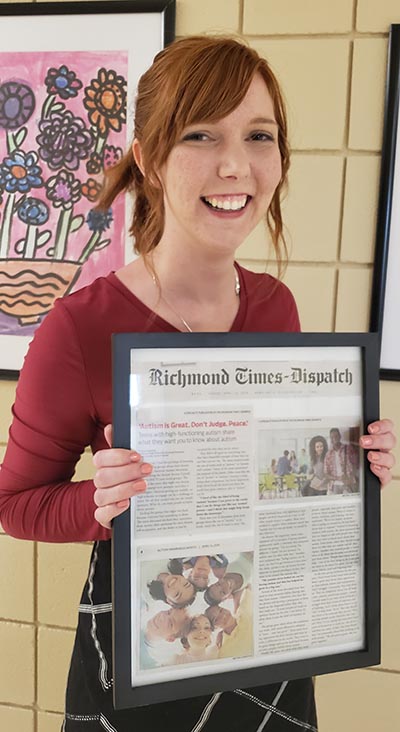Article by VCU SOE doctoral student featured in RT-D
'Autism is Great. Don't Judge. Peace.'
Teens with high-functioning autism share what they want you to know about autism
By Lindsay Kozachuk, VCU School of Education doctoral student
Ph.D. in Education, Concentration in Counselor Education and Supervision
April 14, 2019

School of Education.
Last month I had the privilege of listening to teens talk in groups about their honest thoughts on National Autism Awareness Month during the Autism Society Central Virginia (ASCV) teen social groups. The energy in the room that night was electric. I was prepared with prompts, activities, a monologue—because getting any middle- or high-schooler to engage can be a challenge at times. Yet all they needed was just the simple question: What do you want people to know about autism?
Ending the groups that night was hard because everyone had something to share. The teens discussed the hurt they experience from society, their optimism for their futures, self-acceptance, and the desire to just be accepted for who they are by others.
They didn’t all agree on everything, but that was a beautiful example of how they are just like anyone else. The teens wrestled with the use of terms such as “autistic” or “person with autism.” Some of the teens questioned the purpose of the labels. Other teens like the use of “autism” or “autistic” because it helps define their uniqueness, but more important, helps them break the mold and show the world how great someone who is “autistic” can be.
There was a lot of discussion from both groups about the use of “autistic” as an insult, much like the R-word is used. The teens expressed deep pain and hurt at how people use their diagnosis as a way to call other people stupid or useless. Most teens nodded in support when someone stated that “autistic has become an insult—it would be fine otherwise.”
Yet despite the negativity, many teens expressed self-acceptance. A group member passionately made a comment that resonated around the group: “I’m not weird, I’m different. I know I’m not normal, I’m autistic and I’m okay with that.” Another teen explained that “being autistic can be hard, yes, but I’ve got better at it over time.” For them, autism is not an excuse for bad behavior or special privileges; in fact, they want to be treated like anyone else.
Several of the teens discussed how they need to trust someone before sharing that they have autism. Otherwise, they fear that the person will develop a perception of them based on the diagnosis rather than who they really are. “[I want people to] build an opinion, know me for who I am before [I] allow them to put the label [of autism] on me.”
“I kind of like the label of being ‘autistic’ because I can prove to the world that I can do things just like any ‘normal’ person—and I think that might help break down the stereotype.”
The group grew silent when this statement was made, with quiet affirmative whispers of “wow… that was good.” These teens have big aspirations for their futures and want to make a difference in the world. They want to do great things and not be held back because of other people’s beliefs about autism.
Finally, the teens described what they want people, especially their peers and teachers, to know about autism. When it comes to insults, isolation, and bullying, one teen explained: “We’re not stupid, we know what is going on around us, we just don’t know how to respond.” Instead of shunning students with autism, the teens explained that they are happy to talk with people who show that they want to know more about their autism. Even better, when their friends accept them for who they are, autism and all, they rejoice. Another teen wanted people to know what to do when she becomes overwhelmed and shuts down. “People don’t know how to help—one of the best things to do is not give me more to do when I’m upset. Let me calm down. Music, sand and fidgeting help.”
“My parents never bailed me out for having autism and that has helped me grow in a big way.”
As the teen group facilitator for the past year, I have heard many teens with autism share a great deal about their experiences in their schools, homes and communities. And I struggle. Constantly. Not with them, no. They are insightful, funny (we all laugh a lot), creative, and honest people—people I would want in my own circle of friends. I struggle with their stories of rejection and of bullying. And I think about how it is my “job” to help them “fit in.” But why should they have to be someone they are not? Why not help people accept them for who they are? Now I’m not saying the teens don’t have parts of themselves to work on—we all do— and they are aware of this. One teen shared that “my personality flaws have nothing to do with autism.” We all need to grow, why not grow together?
Article no longer available on Richmond Times-Dispatch website